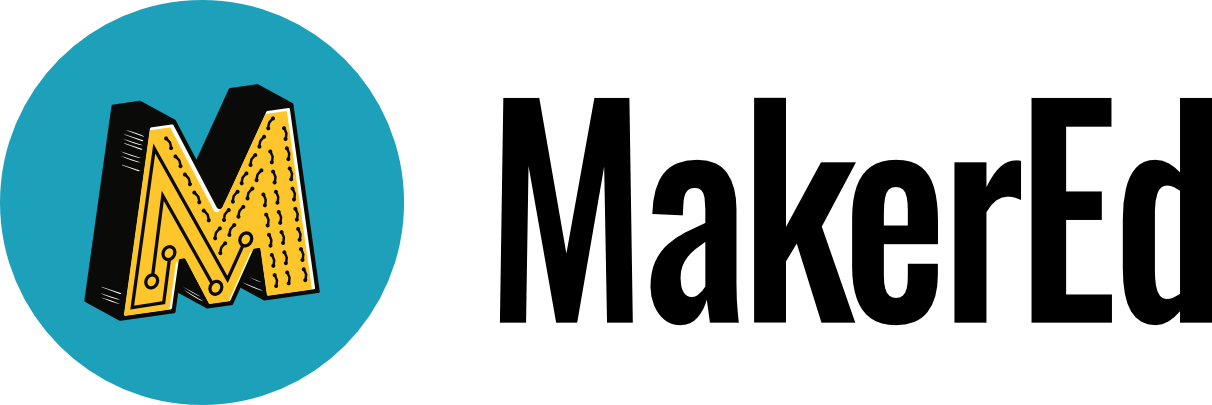2016 was a big year for making and maker education, especially for us here at Maker Ed! As the year comes to a close, we want to share a list of our favorite 2016 highlights: from proud programs to cutting edge research, from international partners to inspiring youth, read about the amazing year at Maker Ed!
Maker Corps, 2016
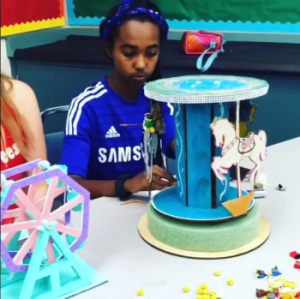
This year marked another amazing year for Maker Ed’s Maker Corps program. Under the leadership of new program manager, Katie Barthelow, 2016 saw a network of 41 partner organizations from 25 states and countries employ over 100 Maker Corps Members and reach more than 170,000 youth and family members. This also marked the first year that the Maker Corps program expanded to international sites, with partners in the UK, Canada, and Nigeria! During the summer, Maker Corps partner sites brought making to youth through camps on robotics, repurposing waste, music video production, phone application creation, and much more. One library even partnered with a local community garden and had youth use aquaponics piping to decorate the garden with 3D printed gargoyle fixtures! Read all about the amazing work being done across the country at our Maker Corps partner sites in these blog posts.
Research
As maker education becomes increasingly prevalent in schools and learning environments across the country, more and more work is being done to research the impacts, benefits, and challenges of this movement. Maker Ed released research findings based on the needs of maker educators and the impact, benefits, and challenges of supporting making with youth. Take a look at our 2-page key findings from the study, or view the full report from SRI International.
Professional Development for Maker Educators

This year, we were so excited to see an increase in professional development opportunities for maker educators. We launched the official Professional Development category of our Resource Library, complete with 8 self-paced modules around common introductory maker education topics, and 4 new full-length video resources.
In addition, micro-credentials—research-backed, expert-assessed, representations of learned skills or competencies that can be presented as a digital badge—are gaining popularity, and educators can now be formally recognized for the skills and competencies they learn throughout their careers.
In October, Maker Ed announced the launch of a set of free, online, self-paced professional development modules titled, “Getting Started with Making,” In partnership with Digital Promise and their micro-credential platform, we released this set of six maker education micro-credentials as a starting point for educators who want to showcase their expertise in making.
Maker VISTA, 2016
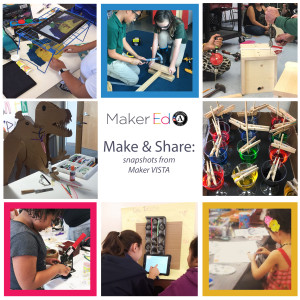
2016 also marked another amazing year for Maker Ed’s Maker VISTA program and program manager, Daniella Shoshan. Already in this school year, Maker VISTAs across the country have built and boosted their sites’ capacity for making through the creation of makerspaces and mobile making tool kits, websites, community and cultural making events, volunteer and teacher training workshops, local business partnerships, STEAM career days and field trips, and much, much more.
The Maker VISTA program has grown from 11 VISTA members and 2 VISTA leaders across 8 sites in 2015-2016, to 15 VISTA member and 2 VISTA leaders across 10 sites in 2016-2017. Maker VISTA’s three new partner sites (ReCreate in Roseville, CA; Computers4Kids in Charlottesville, VA; Drew Charter School in Atlanta, GA) already exhibit the potential and need to be long-term, committed, and inspiring collaborators. The amazing work that Maker VISTA members do across the country takes on many forms, and stories of these exciting feats of capacity building can be found here.
Open Portfolio Project, 2016
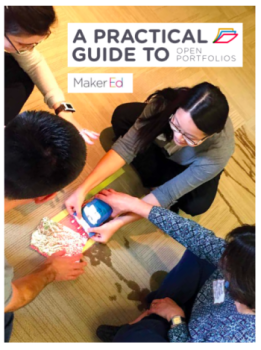 Some of the most common questions asked by maker educators new and old are around assessment. At Maker Ed, our Open Portfolio Project (OPP), led by our Director of Programs, Stephanie Chang, aims to develop a common framework for documenting, sharing, and assessing learning through portfolios. This year, we hosted two OPP workshops, one in Pittsburgh and one in Palo Alto, CA, and released “A Practical Guide to Open Portfolios.” Also, in July, Maker Ed’s Program Director, Stephanie Chang, and Chad Ratliff, Director of Instructional Programs at Albemarle County Public Schools in Virginia, published “Assessment in Making” on Edutopia.
Some of the most common questions asked by maker educators new and old are around assessment. At Maker Ed, our Open Portfolio Project (OPP), led by our Director of Programs, Stephanie Chang, aims to develop a common framework for documenting, sharing, and assessing learning through portfolios. This year, we hosted two OPP workshops, one in Pittsburgh and one in Palo Alto, CA, and released “A Practical Guide to Open Portfolios.” Also, in July, Maker Ed’s Program Director, Stephanie Chang, and Chad Ratliff, Director of Instructional Programs at Albemarle County Public Schools in Virginia, published “Assessment in Making” on Edutopia.
Making Spaces
In 2016, Maker Ed launched an exciting new program called Making Spaces: Expanding Maker Education Across the Nation. In partnership with Google and Children’s Museum of Pittsburgh (CMP), this project aims to develop a national strategy to sustainably integrate making into schools across the country. In 2016-2017, with Julia Petraglia at the helm, the program will employ an innovative model where multiple participating schools partner with a nearby Regional Hub (such as a school district, library, museum, or community organization). These Hubs will provide schools with support to help jumpstart and sustain maker education in classrooms through crowdfunding, professional development, and community engagement. The Hub @ Maker Ed has just finished selecting 7 schools from all over the country to be a part of our network including Hawaii, Washington State, Idaho, Minnesota and Arkansas, as well as two local Bay Area schools. Together, CMP & Maker Ed are designing a suite of resources and tools that hubs and schools can use to support the integration of making into schools and educational spaces across the country.
Ed Forum at the World Maker Faire
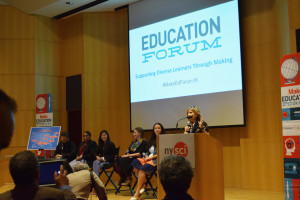
In advance of this year’s World Maker Faire in New York, Make:, Maker Ed, and the New York Hall of Science co-hosted the Make: Education Forum. This all day event for educators featured a keynote talk by Pam Moran and Ira Socol from Albemarle County Public Schools, and additional panels about the successful application of maker education in various formal and informal learning environments.
In reality, all of us who are in classrooms know that it’s not policy that either causes things to happen in classrooms or changes practice, it’s about philosophy, it’s about our beliefs and it’s about our values. So what we want to talk about today is how we reframe the idea of who we are through a values-based focus versus a policy or law-based focus.
-Pam Moran
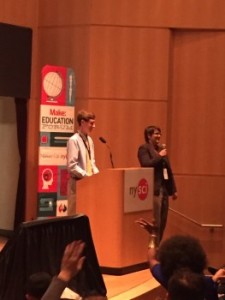
An amazing highlight of this event was the speech given by Julian Waters, a senior at Western Albemarle High School in Crozet, Virginia.
Throughout my education, I’ve very clearly seen the ‘standardized’ system that current educational regulations force students into. The same learning environment and the same curriculum for every student must mean the same education experience, right? Wrong. And that’s why we’re all here. There’s no need to talk ad nauseam about why the system isn’t working for every student — we all know it. Instead, the productive conversation is about how schools have and are working to fix this issue.
-Julian Waters
Young Makers, 2016
Finally, we teamed up with the Boy Scouts of America and Cognizant to bring the Young Makers framework to more youth through the BSA’s Exploring programs. We’re excited to see where this partnership goes in 2017.
Overall, it’s been an exciting year for Maker Ed—and we’re looking forward to accomplishing even more in 2017. We’d love to hear what you’ve been up to this year as well. Please comment below and tell us what you’re most proud of achieving in your makerspace in 2016!
